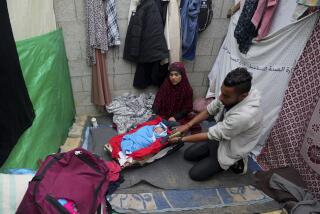Armed civilians are joining the fight against Islamic State in Mosul, Iraqi officials say
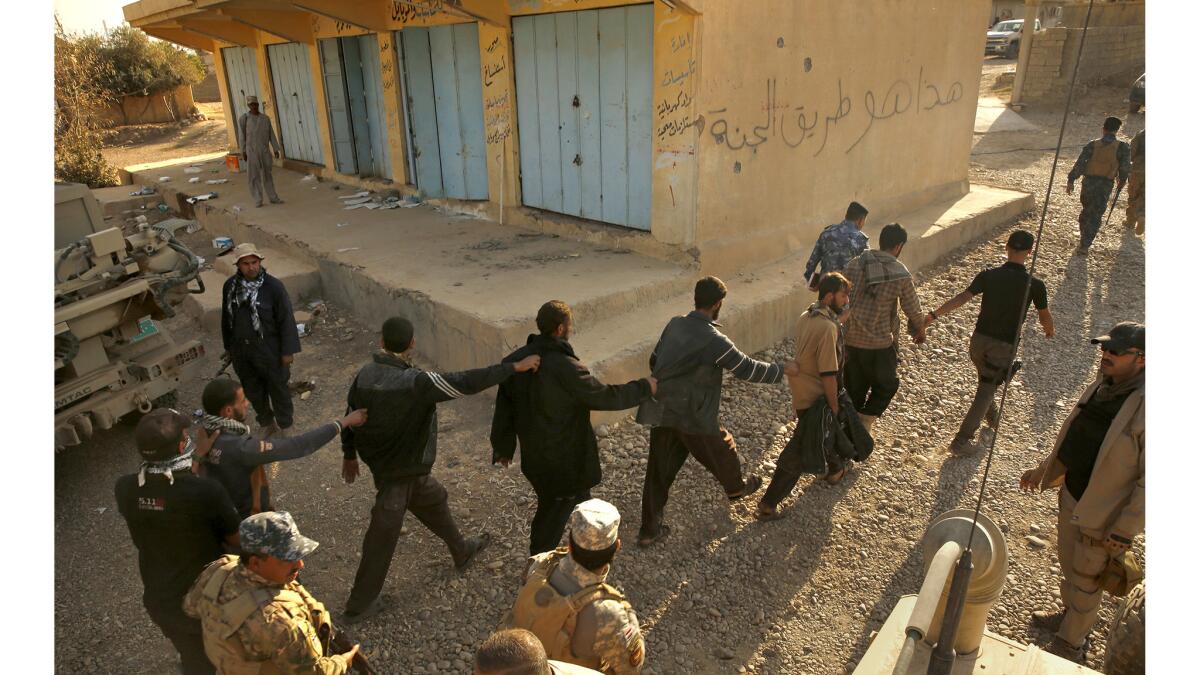
- Share via
Reporting from Salhiya, Iraq — A group of civilians took up arms and joined the fight against Islamic State on Friday as Iraqi forces continued to close in on Iraq’s second-largest city, defense officials said.
“There is a demonstration from within Mosul, on the [east] side,” said Brig. Gen. Tahsin Ibrahim, spokesman for Iraq’s ministry of defense. “Some of them have guns — they have AKs and pistols,” he said.
A number of civilians have organized into a unit that is “inside now fighting against ISIS,” Ibrahim said, using an acronym for the militant group.
“We have contact with them and the news is very good,” he said.
Iraqi forces have said civilian support will be crucial to retaking Islamic State’s stronghold in Iraq, but they cautioned that civilian combatants will face the same challenge Iraqi troops face: how to combat the group without risking the lives of innocents.
Since the beginning of the Mosul offensive Oct. 17, Iraqi forces and their allies have surrounded the city of 1.2 million without mass casualties. But they are struggling to cope with an elusive enemy that blends with civilians, takes them hostage and executes those who get in their way.
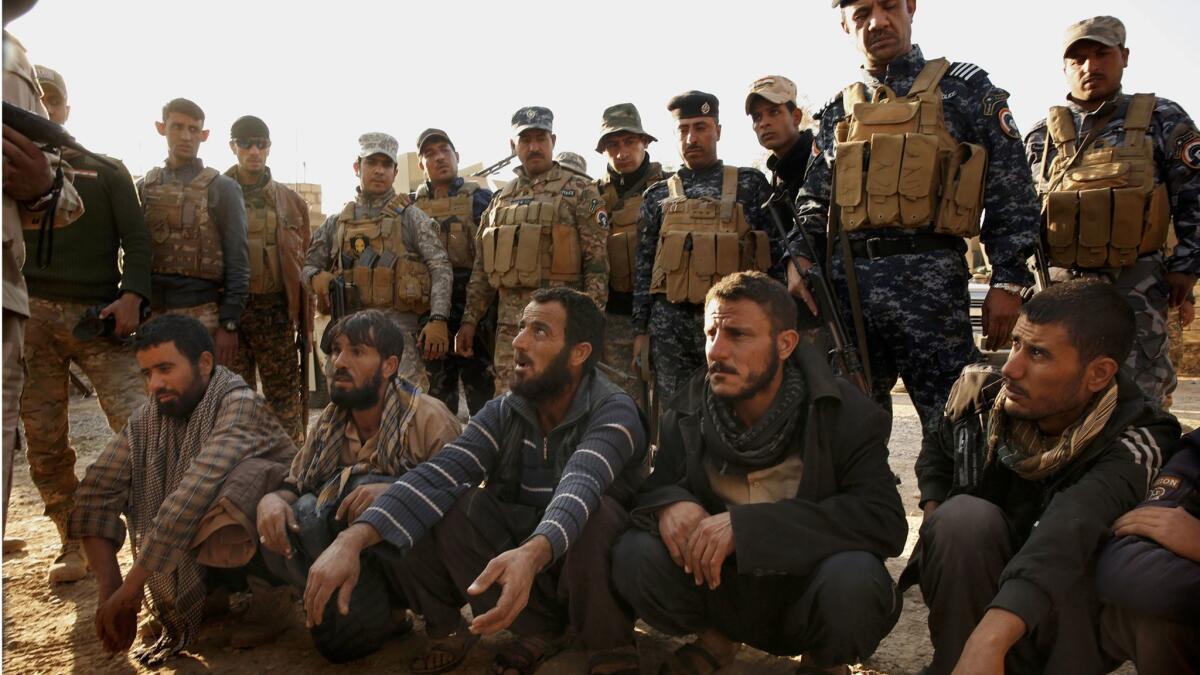
Iraqi counter-terrorism forces entered the eastern Mosul neighborhoods of Adl, Entisar, Karama, Nur and Qahira on Friday, Ibrahim said. They were heading for one of the five bridges that span the Tigris River, which bisects the city.
“Our advance was so slow toward the Karama neighborhood. We had heavy clashes with ISIS and they were resisting fiercely,” said Sgt. Maj. Hatab Bashir Rashid, who was fighting with the Najaf Battalion of Iraqi special forces. He said a coalition airstrike wasn’t enough to allow them to capture the area.
U.S. Air Force Col. John Dorrian, spokesman for the U.S.-led coalition in Iraq, said Friday that significant progress has been made.
“Some Iraqi forces have reached Mosul and others continue advancing toward the city, making steady progress as [Islamic State] is forced to fall back,” he said.

Iraqi Soldiers and police questioned a group of men fleeing the Mosul offensive on Thursday in Salhiya, Iraq. Police concluded the men might be refugees. (Video by Molly Hennessy-Fiske / Los Angeles Times)
He said the coalition has launched more than 3,000 air, artillery and rocket strikes since the offensive began.
“The advance of the Iraqi security forces on Mosul further complicates the enemy’s ability to command and control its fighters,” he said.
Six young bearded men crossed the Tigris River on Friday to this newly freed village of Salhiya. As Iraqi troops watched their approach, it seemed they could have been Islamic State fighters, or fleeing civilians.
They didn’t carry white flags. But they were unarmed.
“I’m from Hamam Ali,” one of them said — naming a city across the river, about 20 miles south of Mosul, that Iraqi forces have been trying to wrestle from the militants.
Soldiers detained the men as suspects.
“We know very well many ISIS [fighters] run away with the people,” Maj. Gen. Najim Jabouri said as he watched the men being interrogated.
After the six men were stopped, soldiers and police marched them up the road for questioning outside a command post in an abandoned house. Each walked with his hands on the next man’s shoulders. At the command post, officers sat the group in the dirt and questioned them, taking careful notes.
What are your names, they asked, and where did you come from?
The men hung their heads.
“Yunis Ali Saleh,” said one in a blue shirt, gray pants and sandals. “From Nimrud.”
Police concluded the men might be refugees, and relaxed a bit. They would have to run the list of names past locals to be sure.
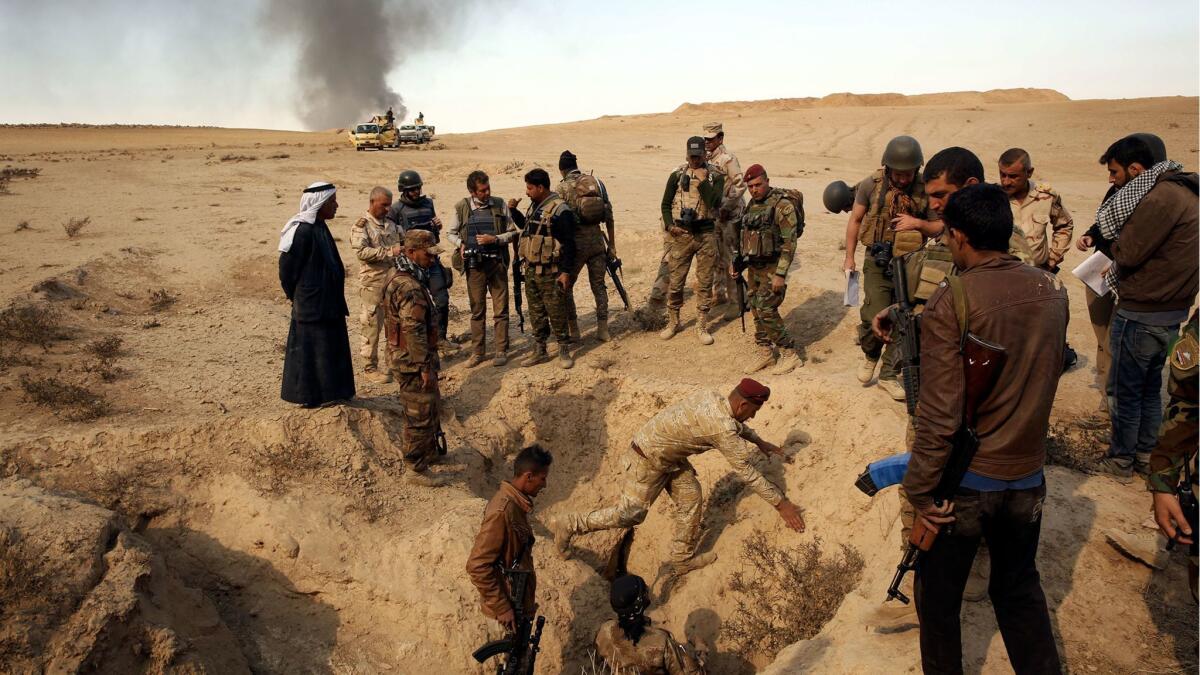
On their drive out to the post, officials had handcuffed and detained another suspect, an elderly man whom they would also investigate, Brig. Gen. Firas Bashar said. He said they have arrested more than 100 Islamic State suspects in the area.
“The civilians always are coming to us with information,” he said, although he allowed that sometimes informants are falsely fingering those against whom they have grudges.
The day before, Iraqi troops caught a group of eight bearded suspects in civilian clothes in the nearby village of Nah Nah. They relied on locals to identify the group. Six of the men were civilians, they said — but two, they concluded, were Islamic State fighters.
Earlier Friday, troops had paused on a hill overlooking the river to urge civilians to leave, broadcasting messages from the back of a pickup truck through a massive speaker provided by the U.S.-led coalition.
“We are your Iraqi brothers,” Bashar’s voice boomed. “Civilians, we are calling on you to raise a white flag and go to Diwaniya.”
On the other side of the river, in the direction of Hamam Ali, nothing stirred.
Militants have been instructing residents since the offensive started to hand over boys ages 9 and older to fight, Ravina Shamdasani, spokeswoman for the United Nations refugee agency, said at a Friday briefing in Geneva.
Shamdasani said the U.N. continues to receive reports of mass killings by Islamic State, including 50 of its own militants killed Monday at Mosul’s Ghazlani military base for alleged desertion.
Iraqi forces have surrounded the city, with help from U.S. and other coalition airstrikes. Once they conquer it, there’s just one more village to capture before they reach the southern edge of Mosul, Brig. Gen. Tahsin Ibrahim said from a tent at Qayyarah Airfield West, where he and other Iraqi officials coordinate the offensive with U.S. coalition partners.
They believe at least 20,000 civilians are still in Hammam Ali, and they will be at risk should the troops press forward against Islamic State militants who are occupying the town.
“We can’t take it right now — we’re afraid about the civilians. If we go inside Hamam Ali right now, some children and families will be killed,” Ibrahim said. “This is our challenge.”
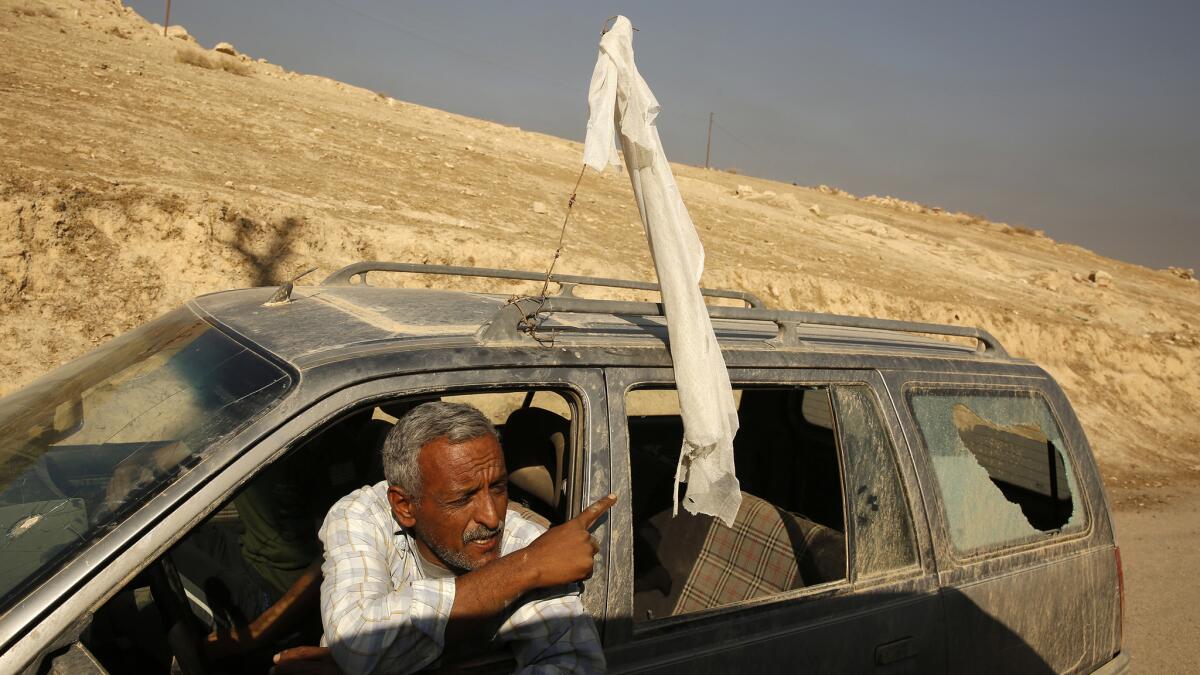
Islamic State fighters have forced 8,000 families from surrounding villages into Mosul as human shields, he said, “like a dam in front of us.”
“Our main concern is that we can’t get the civilians out,” he said. “This is our crisis. We changed our rules of engagement to take care of civilians.”
He said Islamic State is also using new strategies, blending into their surroundings like chameleons, outfitting black Iraqi Army-style Humvees as suicide cars. In one case, a Russian tank was hidden inside a house.
But the jihadis are losing support, Ibrahim insisted. He displayed a cellphone photo which he said showed a would-be suicide bomber with an armored car. The man, he said, had surrendered instead of detonating himself.
“Their minds change. Their morale right now is down. Every day they lose more fighters,” he said.
Ibrahim said Iraqi forces have lost fewer than 100 soldiers, less than they had expected at this point in the offensive.
They have taken 300 to 400 Islamic State prisoners, Jabouri said, including four detained late Thursday while trying to blend with civilians
But Iraqi troops have also received reports of civilians executed by Islamic State before soldiers could reach them.
Capt. Taha Diab Ramadan, 32, helped free his village of Hud to the south of Mosul two weeks ago, but not before Islamic State executed some of his neighbors.
Militants forced 16 people, including women and children, into a house and then blew it up, Ramadan said Friday as he drove through the village. He pointed out other bombed buildings, including his former home.
Ramadan said his family suffered reprisals because the jihadis knew he was in the army. They took his 39-year-old brother hostage, he said, plucking his beard out with pliers and forcing him into Hamam Ali.
On Friday, Ramadan drove his Humvee down a barren desert road to a series of crevasses. The first contained the body of a Kurdish soldier, the second five civilians — Christian and Yazidi religious minorities. All were executed by Islamic State, some in recent months, according to local residents who had gathered to examine the graves.
Ramadan said he wasn’t just worried about his brother; he was worried about all of the civilians trapped by Islamic State as the offensive proceeds.
“I’m fighting for all of them,” he said. “They are all my brothers.”
Special correspondent Wael Resol contributed to this report.
ALSO
What the top U.S. commander in the Middle East says about fighting Islamic State
Facing fierce resistance from Islamic State, Iraqi army crosses into Mosul
More to Read
Sign up for Essential California
The most important California stories and recommendations in your inbox every morning.
You may occasionally receive promotional content from the Los Angeles Times.


